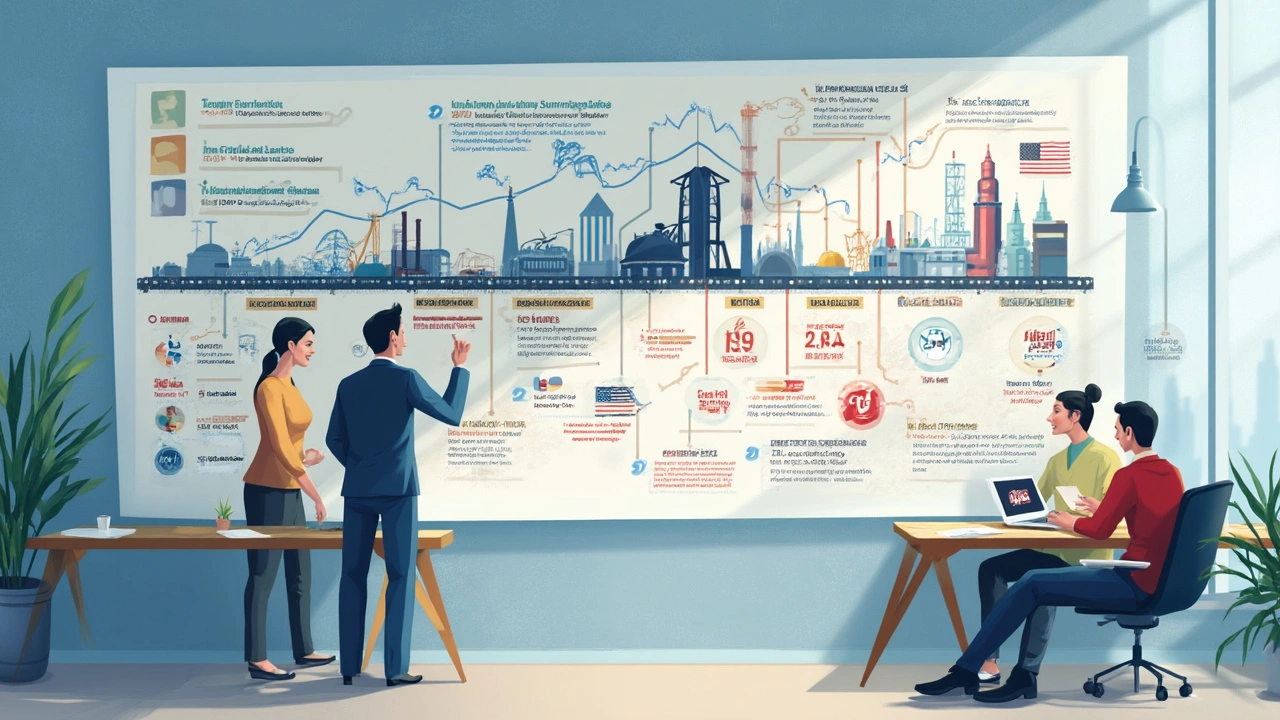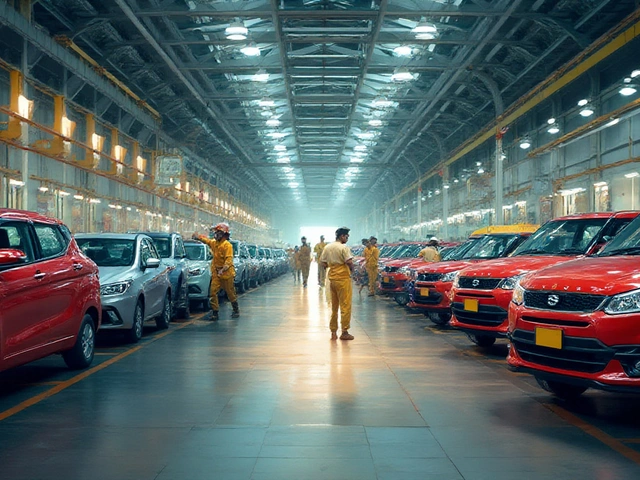Some rumors just don’t quit, especially in the world of business. Take Nucor Corporation, for example. Is it Russian owned? People toss this question around the internet every few months, especially during geopolitical shake-ups or when supply chain stories hit the headlines. And when it comes to the steel industry—always a target for speculation—this one keeps cropping up. Let’s dig in, separate fact from fiction, and draw a clear map of who really controls Nucor Corporation.
Who Actually Owns Nucor?
Nucor stands as the largest steel producer in the United States and it didn’t get to that position by hiding its ownership in the shadows. If you poke around the stock market or financial filings, you’ll come up with something surprisingly boring: Nucor is an American company traded on the New York Stock Exchange under the ticker NUE. The real twist? It has absolutely zero Russian individuals or companies on its board, among its executive team, or listed among major shareholders.
Major institutional investors in Nucor include familiar names like The Vanguard Group, BlackRock, and State Street. In fact, if you scan through the latest SEC 13F filings, these big players own over 20% of Nucor’s outstanding shares combined. The rest of the stock is held by mutual funds, pension funds, and retail investors, mostly in the United States. Russian oligarchs? Nowhere to be found.
The company’s headquarters are in Charlotte, North Carolina, and its leadership is as American as they come. Nucor’s CEO (as of 2024), Leon J. Topalian, was born and raised in the US, and the board’s bios are filled with careers forged in North American industry, not Eastern Europe.
None of Nucor’s SEC filings, annual reports (known as 10-Ks), or investor presentations make reference to Russian ownership or significant Russian investment. If major Russian money tried to move in on a company as hefty as Nucor, the news would be impossible to miss—reporters jump on these kinds of stories instantly. Even under the strictest sanctions and regulatory scrutiny after 2022, Nucor’s compliance reports have shown only regular American business dealings. A quick look at the company’s proxy statements tells the same story—no Russian connections.
Here’s the main thing you need to know: Any public company in the U.S. is legally required to disclose major shareholders, significant ownership changes, and transactions involving foreign entities. Nucor meets all those disclosure requirements. No Russian entity or citizens are listed. To put it bluntly: Nucor is as American as steel gets.
| Top Institutional Shareholders | Ownership Percentage (%) |
|---|---|
| The Vanguard Group | 12.1 |
| BlackRock | 9.2 |
| State Street | 4.4 |
| Other US Institutional | 28.0 |
| Individual & Mutual Funds | 46.3 |
| Foreign Investors (Non-Russian) | <1.0 |

How Did the Rumor Start? Examining the Origins
Crazy how fast an internet rumor can take hold. It only takes a slightly misleading tweet or a misinformed news article. When tensions flare between the West and Russia (think about the 2022 invasion of Ukraine, or the waves of sanctions that followed), all sorts of American businesses find themselves dragged into wild speculation about foreign ownership or influence.
So, why Nucor? One reason might be Nucor’s size and importance. It’s a Fortune 500 giant, a critical part of American infrastructure, everything from skyscrapers to car factories use Nucor steel. If someone wanted to worry the average American, rumors about Nucor being in foreign hands would hit home. Even some talk shows and social media posts have parroted the line—without a shred of hard evidence. These rumors got traction not from facts, but from a mix of misunderstanding and a social media echo chamber.
There’s a second factor: the steel supply chain is global. Sometimes Nucor, like other steelmakers, sources raw materials worldwide. That means iron ore or coal might come from overseas, including places like Brazil, Canada, or occasionally less obvious regions. Never Russia, though—not in any direct supply arrangement according to Nucor’s purchasing disclosures.
Some confusion has come from distorted coverage of the broader steel industry’s tangled global networks. Some other international players, mainly in Europe, have had complicated Russian business histories. But none of those ever tied to Nucor. If you search for Nucor in any U.S. Treasury or Commerce Department lists of companies with Russian ties or sanctioned ownership, you won’t find it. The misunderstanding spreads when people confuse Nucor with steelmakers like ArcelorMittal (global) or Severstal (Russian). It’s a real stretch, but the mix up is easy if you don’t follow the industry closely.
There was also a viral post during the early 2020s that lumped together a long list of American companies, claiming that several were secretly controlled by foreign money. Nucor’s name appeared for no reason but alphabetical order, literally side-by-side with unrelated, globally owned companies. No facts, no sources, just a meme-format spreadsheet. Yet that’s all it takes for a rumor to snowball.
If you look at actual government data and SEC filings, you’ll see no ties to sanctioned individuals, Russian energy multinationals, or oligarchs. A few fact-checking websites have tried to stamp out these rumors, but the steel industry is complicated—and headlines travel faster than corrections. So, next time someone tries to tie Nucor to Russia, check their sources. You’ll likely find they’re chasing shadows.

Why Is Nucor American through and through?
Nucor didn’t just land in the United States—it was built here, brick by brick, over decades. It started way back in 1905 as Reo Motor Car Company and eventually pivoted to steelmaking in the 1960s. Every step of its growth happened on American soil. Its rise came with the shift from blast furnaces to mini-mills—a type of steel mill powered by scrap and electricity rather than imported ore and coal. That’s a big reason why Nucor weathered international supply chain shocks better than traditional giants.
Nucor invests heavily in American workers, operating over 25 scrappy, decentralized steel mills from the South to the Midwest. The company has won praise—and occasionally criticism—for sticking closely to a pay-for-performance model that rewards production crews with profit-sharing. Its profits go right back to reinvestment and American payroll, not to overseas shell accounts. In fact, Nucor’s latest Sustainability Report brags about creating more than 30,000 direct and supplier-supported jobs, the vast majority in the U.S.
In 2023, Nucor produced nearly 20% of all American-made steel, making U.S. bridges, cars, appliances, skyscrapers, and heavy machinery. That’s decades of building trust with local governments, unions, and communities. Even Nucor’s research and development efforts are stateside—they opened a tech center in North Carolina to help create new steels for safe cars and sustainable construction.
Nucor Corporation is relentlessly transparent. Financial reports get filed on time. Earnings calls are open to the press, and annual shareholder meetings draw questions from Midwest retirees as well as Wall Street suits. When news outlets ask tough questions about foreign suppliers or possible security risks, they get detailed and direct answers from leadership—always American.
For those obsessed with the nuts and bolts, here are a few tips to check any company’s ownership for yourself—no matter the rumor:
- Search for the company’s latest 10-K and proxy filings (available on the SEC EDGAR database).
- Look up the senior management and board of directors; reputable sites like Yahoo Finance break these down by nationality.
- Track the institutional shareholders—see if any foreign entity owns more than 5% (which triggers disclosure).
- If foreign ownership crosses 10%, U.S. law (the CFIUS process) demands a national security review. No such filing exists for Nucor.
- Google the company’s name along with “sanctions,” “Russia,” or “foreign owners” and see what shows up—stick with mainstream and government sources.
Nucor’s story isn’t just about steel. It’s a lesson in how quickly misinformation can travel, and how a company’s bedrock American identity can be called into question for no good reason. Next time the ownership rumors hit your social feed, you’ll know how to punch holes in them. Nucor isn’t just not Russian owned—it’s American born, American run, and deeply tied to U.S. towns and workers. And if you want to bet on the American steel comeback? Nucor’s been pushing the wagon for years.





